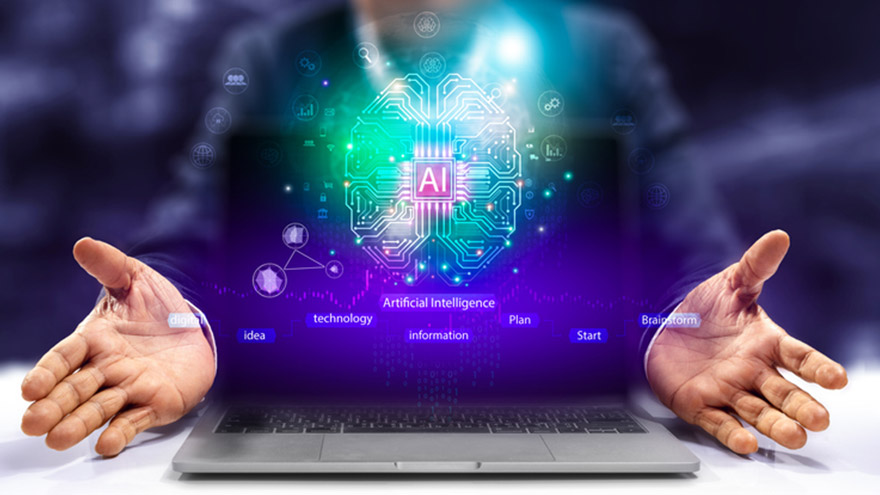Artificial intelligence is helping us find and tackle financial crime faster and more thoroughly than ever before, says Jennifer Calvery.
Views

Cryptographic Inventory: Deriving Value Today, Preparing for Tomorrow
In today’s rapidly evolving threat landscape, organizations face unprecedented challenges in securing their digital assets. This comprehensive white paper explores how a cryptographic inventory serves as both an immediate security enhancement and a strategic foundation for quantum-resistant infrastructure.
Read the PDF English PDF 14.73 MB

Upskilling everyone is vital for the quantum era Opens in new window
Effective preparation for the quantum era will require lots of work and a workforce equipped with the right skills.

The time is now to build quantum defences Opens in new window
Quantum computers will be capable of breaking the encryption standards underpinning our digital world – the time to act is now, says Philip Intallura.

Can AI balance a budget? Opens in new window
Governments across the world need technological improvements to balance the books in order to lift productivity and cut the cost of providing services. Although there are savings to be had, ageing populations will make it hard without more fundamental changes.

Navigating the AI Wave: Innovations in Commercial Payments Opens in new window
As the financial landscape evolves, corporate treasurers are increasingly recognising the transformative potential of Artificial Intelligence (AI) in commercial payments. At HSBC, we are committed to guiding our clients through this journey, envisioning a future where AI seamlessly integrates into payment solutions, making transactions smarter, faster and frictionless.

Asset tokenisation in the Quantum Age Opens in new window
Asset tokenisation is not just an emerging trend, but a transformative force that’s already reshaping the financial services industry. HSBC is assessing ways to future-proof its technology systems using quantum-secure technologies.

Identifiability of Controlled Open Quantum Systems Opens in new window
In this paper, we bring together different approaches to understanding controlled open quantum systems using a unified framework, improving the ability to identify system parameters and paving the way for new methods to analyse these systems.

How the New Economy puts digitisation at the heart of everything Opens in new window
It’s never been more important to be clear minded about the strategic value of digitisation. The New Economy has dramatically broadened the horizon of opportunities for companies looking for an edge in payments and so many other areas. But it’s also upped the expectations around customer experiences and keeping pace with innovation.

Scalable and shallow quantum circuits encoding probability distributions informed by asymptotic entanglement analysis Opens in new window
In this paper, we develop an enhanced matrix product state-based algorithm for efficiently encoding classical data into quantum circuits, demonstrating its accuracy and scalability on financial heavy-tailed distributions using IBM quantum devices.

Evidencing Dissipation Dilution in Large-Scale Arrays of Single-Layer WSe2 Mechanical Resonators Opens in new window
HSBC shows how to use a material that is only three atoms thick, single-layer WSe2, to efficiently create tiny devices that have the potential to be used as the interface to connect quantum computers with quantum networks to transmit quantum information.

ExDBN: Exact learning of Dynamic Bayesian Networks Opens in new window
In this paper, we develop a novel algorithm for causal learning using Bayesian networks, improving efficiency in capturing dynamic effects and demonstrating strong results in both synthetic and real-world applications.

The business case for AI Opens in new window
As the technology powers ahead, businesses are developing the business models that will allow them to compete in the market for AI-driven products.

Quantum Monte Carlo Integration for Simulation-Based Optimisation Opens in new window
HSBC explores integrating quantum algorithms into simulation-based financial optimisations, analysing errors and resources required for quantum Monte Carlo integration, and demonstrating quantum error mitigation for improved financial risk assessments.

Challenges and opportunities in quantum optimization Opens in new window
In this paper, we provide an overview of quantum optimisation, exploring its potential advantages over classical methods and outlining key building blocks, problem classes, and benchmarks to advance the field.

Learning Generalized Hamiltonians using fully Symplectic Mappings Opens in new window
In this paper, we enhance Hamiltonian Neural Networks by using symplectic integrators to accurately preserve energy conservation in complex systems, improving system identification and prediction even with noisy data.

Effects of the entropy source on Monte Carlo simulations Opens in new window
HSBC demonstrates that the use of a quantum random number generator in Monte Carlo simulations can significantly improve accuracy and reduce errors compared to traditional pseudo-random methods.

Multichannel photoionization of cold strontium atoms Opens in new window
In this paper, we explore how cold strontium atoms interact with ultrafast laser pulses, uncovering detailed patterns in the emitted electrons that help us better understand the ionization process.

Thriving in the never normal Opens in new window
As AI accelerates technological disruption, a serial entrepreneur discusses what companies must do to survive and thrive in an everchanging world.

The promise of AI in healthcare Opens in new window
Artificial intelligence – more specifically Generative or GenAI – is set to push the boundaries of what’s possible in the healthcare industry. Faster drug discoveries, personalised medical care and early detection of critical illnesses are real possibilities.

Understanding the transformative potential of GenAI Opens in new window
AI looks set to change the world by creating huge productivity gains that will alter the way we interact with technology in the way we live and work.

Gamechangers – Why the world will never be the same again Opens in new window
How is our world evolving? Watch Global Economist, James Pomeroy and Piers Butler, Head of Global Research Direct, as they explore the global economic impact of the pandemic, technological change, and a climate emergency.

Vision-Language Models Meet Meteorology: Developing Models for Extreme Weather Events Detection with Heatmaps Opens in new window
HSBC has led the development of a new, more accurate method for detecting and predicting extreme weather events using advanced visual and language processing models.

FinTextQA: A Dataset for Long-form Financial Question Answering Opens in new window
HSBC, together with researchers from HKUST and Harvard, introduces the FinTextQA, a comprehensive dataset for long-form financial question answering, and a Retrieval-Augmented Generation-based system, providing a robust evaluation of diverse question types and contexts in finance.

AI Regulations Opens in new window
Policymakers worldwide are devising new regulations, seeking to promote innovation and mitigate potential adverse impacts of generative AI.

Quantum computers’ ‘Chat GPT moment’ is coming Opens in new window
The world is on the cusp of a quantum revolution and we must be ready for the opportunities and threats that will bring, says Philip Intallura.

Spectral Methods for Quantum Optimal Control: Artificial Boundary Conditions Opens in new window
In this paper, HSBC proposes a novel approach to quantum optimal control using artificial boundary conditions and spectral methods, aiming to overcome challenges in quantum state preparation and enhance progress in quantum computing.

AI weather forecasting Opens in new window
The increased frequency and intensity of extreme weather events have stressed the importance of weather forecasting. artificial intelligence could raise forecast accuracy, potentially saving lives and significant climate damages.

Hong Kong Leads in Digital Assets Liquidity Opens in new window
The Hong Kong government’s recent HK$6 billion digital green bonds issuance not only strengthens the city’s position as a global financial hub, but also signposts the future of capital markets.

Humans + machine = an ethical AI future Opens in new window
It’s vital that when humans and machines work together, artificial intelligence is used responsibly and ethically, says EJ Achtner.

Magneto-optical trap reaction microscope for photoionization of cold strontium atoms Opens in new window
HSBC explores the introduction of a magneto-optical trap reaction microscope for strontium atoms, enabling detailed study of their ionization by tracking emitted particles, which helps explore complex electron interactions.

Funding the future: Biopharma and AI optimism Opens in new window
Venture capital is an important source of funding for potentially transformative technologies. Biopharma and artificial intelligence are among the sectors attracting the most interest.

Digital Horizons report Opens in new window
Working with renowned trend forecasters and interviewing leading technology experts, our Digital Horizons report unravels the four key trends shaping the business landscape between now and 2030.

Taming Binarized Neural Networks and Mixed-Integer Programs Opens in new window
HSBC has devised a new method for training simplified, explainable neural networks, thereby enhancing their applicability.

The power of Digital currency programmability Opens in new window
Bojan Obradovic believes the programmability of digital currency could be one of its key benefits – as well as one of its key risks.

Generative AI – Hype vs Reality Opens in new window
Watch now as Mark McDonald, Head of Data Science and Analytics, and Piers Butler, Head of Global Research take a deep dive into the rapid transformations being driven by generative artificial intelligence (AI).

Quantum Multiple Kernel Learning in Financial Classification Tasks Opens in new window
HSBC is exploring the use of Quantum Multiple Kernel Learning (QMKL) to improve the quality of predictive models in finance, demonstrating its effectiveness in tasks like fraud detection.

AI develops fast Opens in new window
The pace of development in Generative Artificial Intelligence (AI) continues to be incredibly fast. We explore three key recent developments in our latest report.

Software Code Quality Measurement: Implications from Metric Distributions Opens in new window
HSBC's research categorises software code quality metrics and proposes a distribution-based method for consistent evaluation, providing practical implications for better software adoption and code quality measurement.

NCGAN: A Calibrated Oversampling Technique for Fraud Detection Opens in new window
HSBC introduces the Negative Calibrated Generative Adversarial Network (NCGAN) together with researchers from Fudan University, a new data oversampling technique for fraud detection that improves precision and F1 score in machine learning models.

An Adversarial Learning with Sum of Top-K Loss Framework for Credit Card Fraud Detection Opens in new window
HSBC has developed the Adversarial Learning with Sum of Top-K Loss (AST) framework together with researchers from Fudan University, a novel solution to improve credit card fraud detection amidst imbalanced data and adversarial attacks.

Reinforcement Learning for Gate Synthesis in Noisy Quantum Systems Opens in new window
HSBC employs the Deep Deterministic Policy Gradient (DDPG) algorithm for effective gate synthesis in noisy quantum environments, highlighting the potential of reinforcement learning techniques in quantum computing applications.

Configured Quantum Reservoir Computing for Multi-Task Machine Learning Opens in new window
HSBC has participated in developing the Configured Quantum Reservoir Computing, a method that improves machine learning and outperforms traditional approaches, providing highly precise predictions in multiple fields including gene networks and foreign exchange markets.

Unsupervised quantum machine learning for fraud detection Opens in new window
HSBC has developed quantum protocols for anomaly detection, applying them to credit card fraud detection, demonstrating potential advantages over traditional machine learning methods, especially as system size increases.

Integration of Macroeconomic Data into Multi-Asset Allocation with Machine Learning Techniques Opens in new window
HSBC proposes a new approach to predict market returns for multiple assets by using machine learning techniques on macroeconomic data, enhancing the performance of investment strategies.
